#radical film theory
Photo
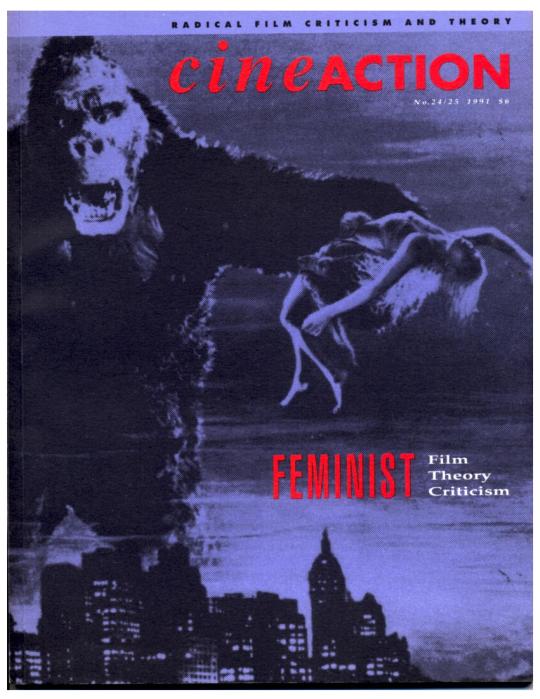
Cineaction no. 24/25 1991
#King Kong#Fay Wray#cineaction#cineaction magazine#cinema#film theory#feminist film theory#radical film theory#film criticism#feminist film criticism#le gothique féminin#damsel in distress#q
2 notes
·
View notes
Text
I feel like the thing Mulan (1998) accomplished better than any other Disney ‘princess’ film was how her society valued women based off 1. their attractiveness and 2. their ability to be submissive.
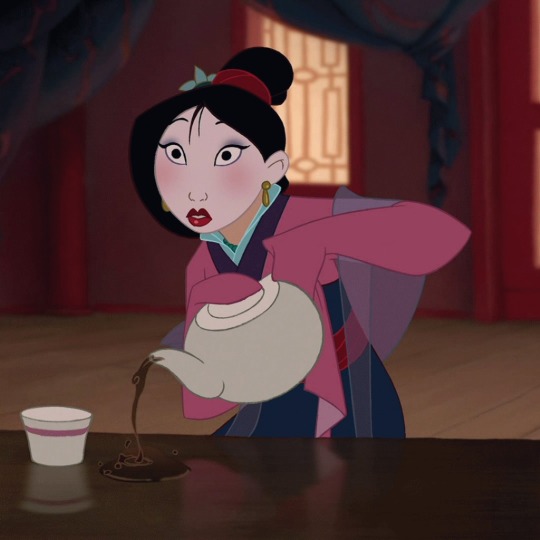
Other Disney movies (ex. Beauty and the Beast) make references to the misogyny women face for being unable to fulfill traditional female roles, but the disgusting standards aren't explored nearly as much as they are in Mulan. The entire song “You'll Bring Honor to Us All” focuses on all these horrible beauty standards she is expected to uphold:
“With good breeding/ And a tiny waist”
“Like a lotus blossom/ Soft and pale”
“a perfect porcelain doll”
But the song also reflects the social status of women and their roles in society:
“Boys will gladly go to war for you”
“A girl can bring her family/ Great honor in one way/ By striking a good match”
“Men want girls with good taste/ Calm/ Obedient/ Who work fast-paced”
“A man by bearing arms/ A girl by bearing sons”

Mulan’s reflection of this caricature she is meant to become is so much more powerful and sticks out even compared to other more recent Disney movies (Frozen, The Princess and the Frog, etc.)
I personally feel like Mulan is the only ‘princess’ who does not fall into the society's expectations of feminity in come category. She does not seek to become an object, and she defies the roles her society wants her to uphold. Mulan is the only Disney film that shows the impossible standards women are given. The only film that comes close to this would be Brave.
#Disney films#disney princess#mulan#hua mulan#mulan (1998)#feminism#feminist#feminist theory#gender roles#gender theory#oppression of women#radical feminism#radical feminist#radfem#libfem#liberal feminist#liberal feminism#intersectionality#intersectional feminist#intersectional feminism#beauty standards#asian feminism#chinese feminism#asian beauty standards
3K notes
·
View notes
Text
Pornography is regularly used in ways that have nothing to do with sexual explicitness. Rather, pornography is commonly understood as a form of propaganda, a representational style linked with defamation and desensitization, if not destruction. Patricia J. Williams, who thinks legally, critically, and gracefully about race, sex, and injustice, calls pornography a "habit of thinking," and one that informs all manner of abusive and exploitative attitudes and relationships. Pornography, as I am using the term, is just that, a worldview, a way of thinking and acting that sexualizes and genders domination and submission, from the bedroom to the war room, making domination masculine (even when a woman plays that role) and submission feminine (even when a man plays that role), and making both the essence of sex. By wedding sexuality to inequality, pornography conditions women and men to have a substantial investment in maintaining the oppressive status quo—again, from interpersonal relationships to international politics.
Pornography kills off, and then substitutes itself for, the erotic—the life force, the earthy and ethereal force of growth, fruitfulness, exuberance, ecstasy, connectedness, and integrity. Pornography severs eroticism from intimacy and empathy and bonds it to voyeurism and objectification (of the self and of another). It incarnates pleasure in acts of hatred. It would have all of us believe, even those of us getting the "fuzzy end of the lollypop" (Sugar/Marilyn Monroe's lament in Some Like It Hot, Billy Wilder, 1959), that without a certain measure of power and powerlessness, danger, fear, pain, possession, shame, distance, and violence there wouldn't be any "sex" at all. Of course, the simultaneously pornographic, monotonous, and erotophobic culture tends to make that true. Variously damaged, alienated, and desensitized, pornography can become what we need in order to feel at all.
Some applaud pornography because it allows access to sexual imagery and language and easily offends offensive religious morality. Yet pornography is no real alternative to systemic sex-negative morality; rather it is an intrinsic part of it. Pornography and mainstream morality both stem from and continually reinforce a worldview that first makes a complex of body/low/sex/dirty/deviant/female/devil and then severs these from mind/high/spirit/pure/normal/male/god. For both, sex itself is the core taboo. Moralism systematically upholds the taboo and pornography systematically violates it. In the complex that evolves from this absurdity, taboo violation itself becomes erotically charged. Evil becomes seductive and the good mostly boring. Without patriarchal moralism's misogyny, homophobia, demand for sexual ignorance, and sin-sex-shame equation, pornography as we know it would not exist. And, together, the two work to maintain the sex and gender status quo.
—Jane Caputi, "Goddesses and Monsters: Women, Myth, Power, and Popular Culture."
#jane caputi#feminism#radical feminism#radblr#radfem#women against pornography#anti-porn#feminist film theory
236 notes
·
View notes
Text
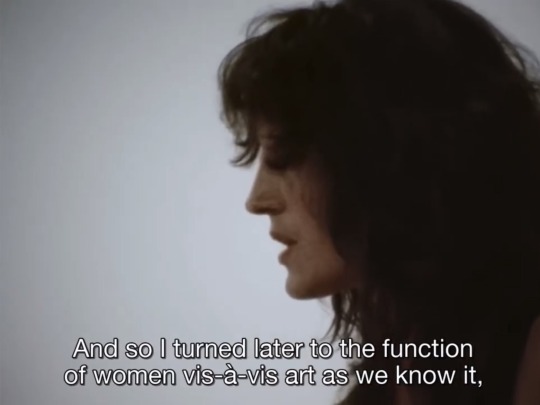
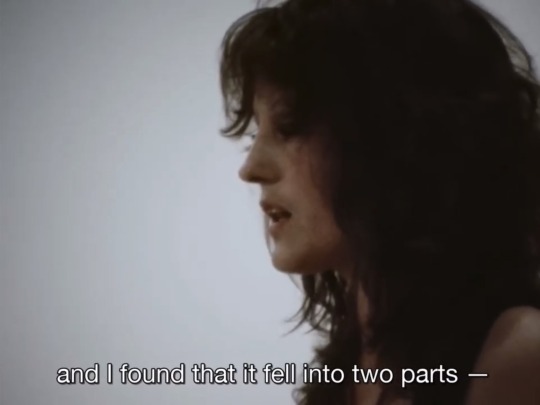
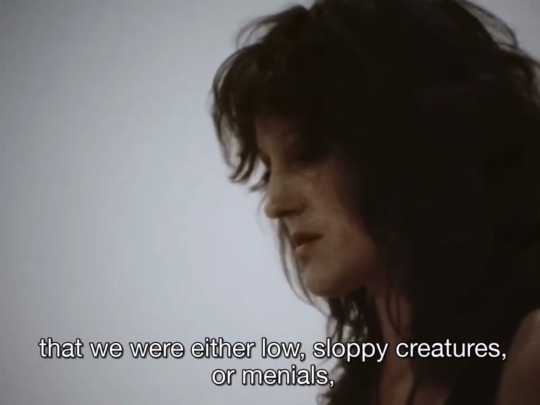
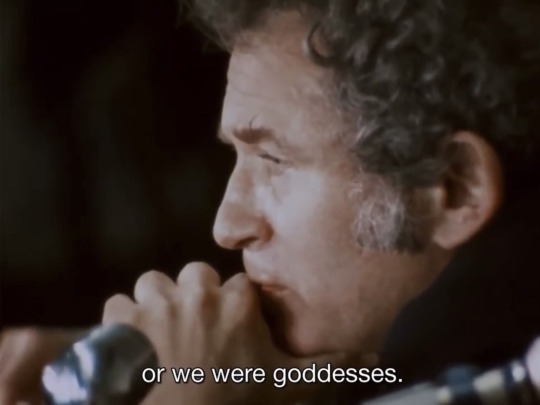
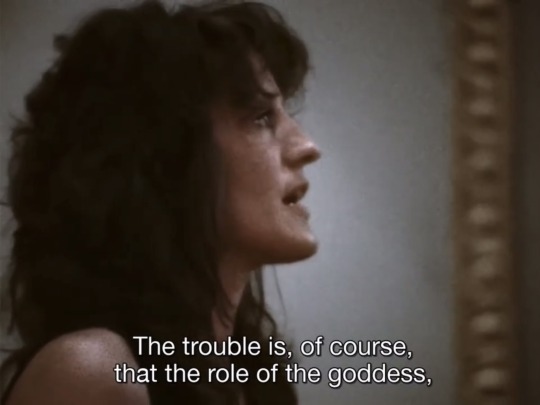
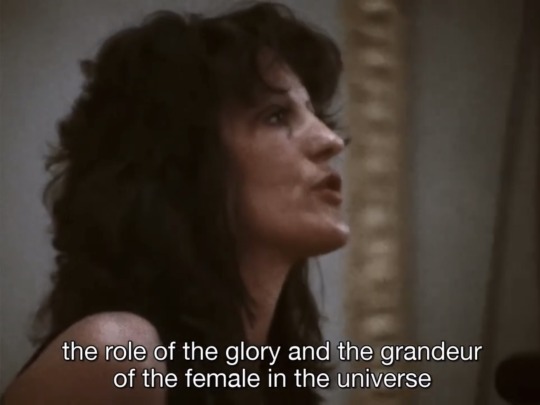
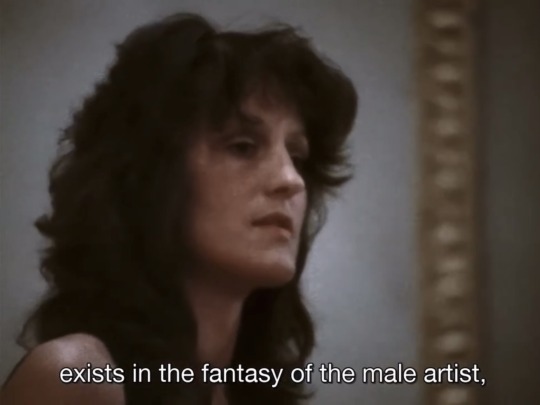
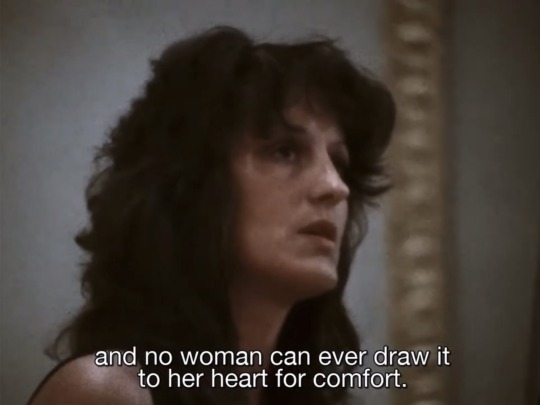

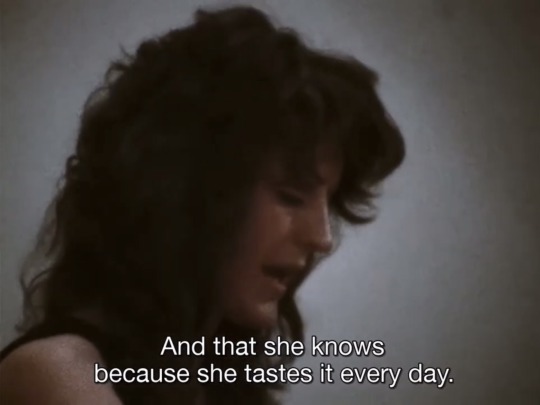

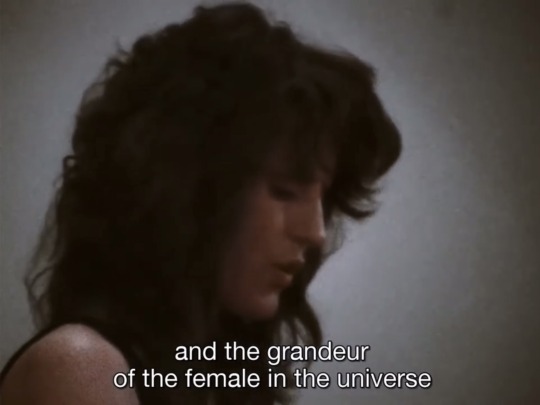

Town Bloody Hall (1979) | dir. Chris Hegedus, D. A. Pennebaker.
#1970s#germaine greer#films#*#directed by women#feminism#female directors#feminist movie#documentary film#60s 70s 80s 90s#70s movies#1970s movies#feminist#feminist film#screencaps#documentary#movies#vintage#quote#film quotes#movie quotes#radical feminism#radfem#radical feminist safe#radical feminist community#radical feminst#radblr#radical feminist theory#feminist media#radical feminists do interact
121 notes
·
View notes
Text
oh my fucking gd my friend’s husband (also my friendly acquaintance) is facebook friends with the guy who wrote that MA thesis on jelonka...i’m going to cold email the guy himself like a freak but i’m not afraid to be like. hey. krzys. wanna do me a solid,
#like any good theater scholar from poznan he seems to have been a very catholic teen with a conspicuous britney spears obsession#who got radicalized in school & has been posting nonstop about strikes & protests since like 2015#by which i mean i'm 98.9% sure this man is gay & looking at his friends list & who we know in common my conviction is all the stronger#& that is outstanding bc it indicates his dissertation title was a deliberate tongue-in-cheek reference to the first ostbloc lesbian film#& i can talk to him about queer theory in the PRL#...assuming he is not ragingly put off by some stranger in chicago emailing him like HEY I LOVE YOUR WORK CAN I READ YOUR MASTER'S THESIS
8 notes
·
View notes
Text
Is Lemony's Kind Editor in the Netflix series?
Throughout the Netflix series, Lemony has used one of his infamous literary devices which I did not notice until rewatching it for the billionth time, when I was working on The Complete Works of Contradictory Logic in ASOUE. More on that to come.
Lemony uses a rather basic device which, I believe, can actually have an ENTIRELY radical new view on the show: Lemony speaks to the camera in the second person.
This just means he uses the pronouns 'you' and 'your', etc, when talking directly to camera.
e.g. TMM: "You could pretend the Duchess of Winnipeg had arrived, and had come to throw the Baudelaires a pony party at her chateau."
However, the 'you' could refer to Lemony's Unnamed Kind Editor. There are some points which back this up:
The Kind Editor is someone who does not know the story of the Baudelaires, they only know Lemony. This is why Lemony is the one to tell them the story of ASOUE.
The Kind Editor is NOT a member of V.F.D. This is why Lemony has to explain [either himself or via other characters] different V.F.D-related things that a member would've already known.
This logic can lead to the following:
Lemony is talking to his Kind Editor, who is filming VIDEO evidence to be used in court when Lemony clears his name and the names of the Baudelaires.
This means that the characters do not physically appear in ASOUE, but rather Lemony just imagines them saying the same words before actually saying them himself. This carries on from the idea (@snicketstrange) that Lemony used the Baudelaires' notes from An Incomplete History (series) or A Series of Unfortunate Events (book canon).
In TCC, the Baudelaires discover the SAME THING filmed by the SAME PERSON - but for ATWQ. Hence the reference to 'Stain'd-by-the-Sea'...
So what's the point?
THEORY: Lemony is using typewritten and video evidence, as filmed by his Kind Editor, in order to clear the names of all 4 people; the Baudelaires and himself.
But who is this mysterious Kind Editor? Many have suggested it to be Moxie Mallahan, as she was only friends with Lemony and no-one else from V.F.D.
However, given the circumstances described, I now present an alternative solution: Beatrice Baudelaire II.
In TBL, Beatrice II is 10 years old, capable of handling a camera. It provides an uncle-niece bonding opportunity for Lemony, and Beatrice gets to know the story of her adoptive parents (from her biological uncle).
Lemony is Beatrice's only hope of finding the Baudelaires, and Beatrice is Lemony's only hope of clearing the Baudelaires' names, as Lemony knows 100% that Beatrice is not an enemy or a spy of any kind.
¬ Th3r3534rch1ngr4ph, Unfortunate Theorist/Snicketologist
#asoue#vfd#lemony snicket#a series of unfortunate events#snicketverse#asoue netflix#theory#kind editor#beatrice baudelaire#beatrice baudelaire ii#tbl#the beatrice letters#an incomplete history#duchess of winnipeg#duchess r#duchess ramona#ramona quimby
134 notes
·
View notes
Text
thinking more about the garden scene, rereading it has just made me want even more for the show to do a "rand and egwene trespassing in the caemlyn palace and meeting gawyn, galad, morgase, and elaida" version of it in early s3! because gawyn is adorable in the book version, but mostly exists as an extension of elayne and a helpful infodumper to explain to rand and the reader what's going on while the other 4 caemlyn characters are carrying the scene.
so in a version of the scene where elayne is not there (as i'd imagine she'd go straight from falme to tanchico, which is pretty nearby, while the rest of the gang could pass through caemlyn in their longer travels), that automatically brings gawyn more into the spotlight and makes him an independent and more noticeable character during that whole sequence. now gawyn alone is defending rand (and egwene) from galad, morgase, and elaida, which would be a strong and memorable first introduction to him as a character. (it would also be a great meetcute for gawene <3 and i'd love to keep the book vibe of gawyn being so kind and friendly to rand and having a huge crush on him when they first meet bc it makes the forthcoming events all the more angsty.)
and in general, the book version of course has elayne as the focal point of the caemlyn sequence, so in the show where the audience already knows and loves elayne from other scenes, an elayne-less caemlyn sequence would be a great opportunity to let the other 4 caemlyn characters shine more. seeing gawyn, galad, morgase, and elaida argue over what to do with these trespassers, without elayne present, would do a lot to shed light on all 4 of them as characters and on the various relationship dynamics between them, which would be really good because the gawyn-elaida dynamic will be key to understanding his role in the coup later in the season (maybe we see him being willing to stand up to galad for the trespassers, but then being kinda cowed and backing down once elaida gets involved), and both gawyn's and galad's relationships with morgase are very central to their individual storylines and motivate a lot of their behavior down the road (more so than elayne, who ofc loves morgase and mourns her death, but doesn't really have those feelings as a main motivator for her behavior).
also, i've gone back to reread the wotseries articles about the shohreh aghdashloo (elaida) and olivia williams (morgase) casting leaks, and uncovered a couple interesting tidbits about the caemlyn filming!
both actresses were spotted on a set that is almost certainly the caemlyn palace (filmed inside a real-life castle with andor's banner hanging up)
wotseries believes that since this set is a location shoot 200 km away from jordan studios, not too much time will be spent there in s3 as frequent shoots there would be inconvenient
this filming occurred in late may 2023 and was for sometime in the first 2 episodes of the season
this all supports my theory of a one-time caemlyn trespassing sequence in approx 3x02! however, wotseries didn't report anything about josha or madeleine being spotted on this set, or about galad's actor or any potential gawyn actors being spotted. but that definitely doesn't mean none of them were there, maybe some or all were but just weren't leaked. on the other hand, i could also imagine maybe there's just one brief caemlyn-set scene of morgase telling elaida to go to the white tower and ask about elayne, and then G&G are introduced later when tagging along on elaida's trip and none of them meet our main characters during this season (or even just gawyn tags along with elaida while galad is instead introduced as a whitecloak in perrin's storyline, though personally i think it's important to galad's story for him to NOT be a whitecloak at first and then become radicalized out of worry for elayne). or it could be that there are multiple scenes in the caemlyn palace but some were filmed on a studio set and this location shoot was only used for a particularly grand room like the throne room or something. many possibilities and such little concrete info to go off of yet!
anyway, overall, i think that first introducing the rest of the caemlyn crew to the audience via their interactions with main characters we already know could potentially be more interesting than introducing them in a vacuum as a totally separate storyline (and indeed, most of the new characters in s2 were introduced via preexisting characters meeting them, iirc). and i think that it would be really great for rand and egwene to get a chance to meet the caemlyn crew before they get tied up in other storylines for the foreseeable future, since elaida and gawyn, in particular, are quite important to both rand and egwene later on (or rather, rand is important to gawyn but not vice versa djkfjg poor gawyn). but only time will tell if i'm onto something here or if i'm way off base!
#wot#wot book spoilers#'how will the caemlyn crew be introduced?' is definitely one of my most-anticipated s3 questions as of now#along with 'what will gawyn's vibe and portrayal be like and who's playing him?'#and 'where on earth is mat what on earth is he up to and does rand get to give him cpr?'#and finally 'what will go down with avirandlayne and what will the vibes be like there?'#AH i want s3 now!!!!!#but i think that very first s2 bts teaser reel dropped only a couple months after filming finished (and along with the s3 greenlight news)#so maybe we'll get some sort of little s3 tidbit relatively soon? along with s4 greenlight news? fingers crossed!
37 notes
·
View notes
Note
Does you actllty like odin because I thought everyone hated him.
...Why would people hate him? I struggle to understand that, even now. I have my theories, which I've spoken off in other places.
I think, and I don't like to say this, because there are certainly takes that aren't, but in general, that opinion is very juvenile. There's a desire to want to 'defend and protect' people from him, which betrays a lack of understanding of the dynamics in the films, and a tendency to side with children over adults, even grown children, and to see older people as symbolic of institutional power, as well as parental power, over them, and therefore a yoke that needs throwing off. There's a childish 'shut up, DAD!' to the criticism. More seriously, the desire to paint him as abusive reminds me of the problem of people confusing conflict for abuse, something that's a major issue in online spaces and real life. Outrage and extremism are rewarded and sought after, so everything is heightened. In that lens, a father who tried to do right by his children but who was in a unique circumstance because of his desire to challenge the status quo and fated enmity of two warrring peoples, a king who can't put the needs of his children over the suffering of his people and risk to his kingdom, now becomes a monster who delights in playing favourites and abusing them for kicks. It's disheartening.
There's precious little sympathy for characters like him, especially in this genre. Superhero fare is pretty black and white, and even characters like Loki rest pretty firmly in the 'good' side of that. But Odin is that rare character who not only doesn't play by that simple dichotomy, he doesn't get to live in a world so neatly divided. It's part of his isolation from the others. So usually, people see the gray and decide he must not be 'good', and if he's not 'good', he must be 'bad'.
The films have little time to explore him or his motivations or how he chooses to navigate his murky situation, and it's all the worse because he's a secretive person who actively disguises his motivations and goals. He's a minor character in screen time, but looms large over the plot and other characters' motivations, so most of what we see of him is what other people tell us he is. Most of which is, of course, untrue. That's the Odin that lives in their heads, and not the actual man, who is the rare character in the MCU you actually have to watch and pay attention to to understand. In universe, no-one bothers to do that - they are content with the version they've created to hate. So the audience thinks that version is also the real one, because it's easier to understand and categorize.
I love Odin, in mythology, and in the MCU. He's a much kinder person in the MCU for sure! But I'm glad that, even in a fairly straightforward world, they gave Odin no clear answers. He remains contradictory and deeply flawed, a thoroughly miserable person but with something compelling him to try and change the destined end of the world. How could I not love someone like that? How could people who say they like Loki not like a character who is so similar?
I get depressed when I encounter Odin haters. I feel like they've completely misunderstood and missed out on a fundamental part of the story, and I worry that if their sentiments infect the actual MCU, it will besmirch the efforts of those who came before and the humane story I fell in love with. Odin was not intended to be a bad parent or a bad person, and I don't think he is. He is intended to be someone that people IN UNIVERSE see as a full villain or as a full hero, but he is neither. He is a person who was faced with difficult choices, and he chose to do some radical things that many others of his kind would never do. He paved the way for a better future and better choices for others by defying the prejudices and traditions of his people, but because he was a trailblazer, he did not have the benefit of learning from others' examples, like Thor and Loki have because of him.
Comparing him to Thanos or other actually abusive parents is repellant. Never once have I seen anyone who claims to hate him actually engage with the character as depicted, nor how they would cut through the Gordian Knot of compromises the character had to contend with. They handwave away the moral questions as 'actually super easy to solve', which is something I abhor in fiction (it's also why I deeply dislike Spider-Man: NWH, which handwaves away the motivations and tragedies of villains from previous series). No, nothing was easy to solve about the choices presented to Odin, and I think the character had both logical and emotional rationale for his choices. He actually made pretty bold and forward-thinking plans, they just all tend to suffer from his fatal flaw - he thinks about them as logical, but they're really motivated by emotion that he keeps at arm's length, which leads to him showing vulnerability and being punished for it.
This is something that goes by so fast in the films, but I loved it because it is such a fundamentally male experience. Odin is someone being crushed under pretty much every expectation of masculinity, from man to warrior to father to husband to king, and whenever he tries to show regret, fallibility or vulnerability, the other characters find it disturbing and swiftly reject him, forcing him back into the performance and the misery that comes with it.
Odin may ponder what is the correct decision, but does not mistake that for what is the most moral decision. He is someone who is both logical and emotional but who hasn't integrated those two halves of himself together very well.
If you hate the character, I'd be happy to talk about it. It is okay to just not like characters! Including gray ones. But for me, I can really think about Odin, and I like that he can't be easily written up for a bland Fandom page that requires everything be spelled out or it 'doesn't count'. He exists in the between spaces of the story, and it is a very sad and lonely tale.
TL;DR : He's a complicated man in a simple story. In the Squid Game of Sugar Cookie, he got the Umbrella. I am sad that such a fundamental character to the foundation of the THOR franchise's quality and themes is so misunderstood and unappreciated by this fandom. I don't think you can love this franchise and not have some care for Odin.
86 notes
·
View notes
Note
Could you explain the "toon" thing? Does that mean, like, cartoons coming through the TV and becoming real? Is that a thing?
Not…exactly. Let me start with a quick primer on parafiction.
Parafiction refers to any phenomena that appears in realspace but had its origins in a work of fiction that was not inherently intended to propagate parafictional phenomena. It refers to the effects, not the origin - parafictional phenomena can occur due to thaumaturgical intervention, Outsider influence, curses, demonic empowerment, and most commonly group psychic influence or a noospheric “dent”. It doesn't have to be an entity, but most people associate it with an entity manifesting.
Let's take, for example, Sherlock Holmes. Say Holmes appears in your town one day attempting to solve a mystery. We'll quickly go over how he'll appear and why that could be.
It is likely he will not be truly sentient - often, parafictional "entities" are a psychic construct, acting in accordance to the gestalt noospheric consensus on how that person should act. Holmes in this case will act confident, clever, snippy, and smoke a pipe - all things that are expected of him. But it'll be a Chinese Room, basically an extranormal learning model, a lowercase ai.
It is likely he will dissipate in days if not hours - these sorts of things are ripples in the noosphere. Unless something is actively keeping it active, it'll probably run out of energy fairly soon.
It is likely he will act confused - if this Holmes is acting mostly like the cultural consensus on Sherlock, but a little confused, this is actually a sign he might be self aware, and thus more serious. We hypothesize this is because the existing sources of media regarding that entity. Every book, every movie, comic, or video game, no matter how dedicated to the source material, is slightly (or radically) different, and each has an effect on the entity. Eventually, self-sustaining parafictional entities will sort out which influences they take from most strongly, but that could take months.
That brings us to "toons." For reasons that are not totally clear, entities that originated primarily from traditional animation have a different path to manifestation and resulting existence. They are, almost to a fault, inherently inimical to human life and realspace in general. We have theories, again regarding the source material.
Think about it this way: traditional animation is typically drawn at 24 frames a second. That's 1440 frames per minute, and even many short cartoons were 3-5 minutes. That's potentially tens of thousands of frames of animation for multiple shorts, compared to....what, in the low hundreds for someone like Sherlock? Something about the individual frames of animation is different, from our tests, than pages or even live action film frames.
Imagine having what's considered "you" spread across tens of thousands of instances. Each one similar enough to the last to smear into each other, smudge into an indiscriminate blur of existence. Whatever "you" are is...a leaking, aching artifice, shattered across tens of thousands of shreds. Trying to move at 24 frames a second, constantly bleeding pigment...nothing should have to live like that.
51 notes
·
View notes
Text
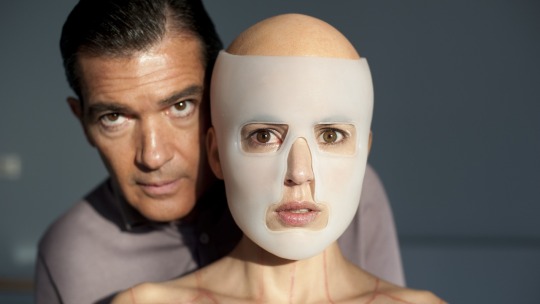


I need an analysis of La piel que habito (The Skin I Live In) through a critical, feminist lense. Radfem, libfem, etc.
(I'm probably gonna end up posting my own.)
#La piel que habito#the skin i live in#foreign film#spanish film#film analysis#media analysis#feminist media#feminist film#gender critical#feminism#feminist#feminist theory#radical feminism#radical feminist#radfem#radfems can interact#radfems do touch#radfems dni#libfem#liberal feminist#liberal feminism#intersectionality#intersectional feminism#intersectional feminist#gender roles#trans inclusive feminism#transfeminism#trans inclusive radical feminism#trans inclusivity#womens studies
6 notes
·
View notes
Text
In a key scene in Red Dragon, an FBI agent tells a group of police officers that there is no doubt that the family serial killer will strike again. “Why?” one woman asks him. “Because it makes him God,” intones the agent. Just days after Red Dragon opened, the police found the Death card from a Tarot deck near the scene of one of the shootings. Inscribed on the card was a message from the shooter. It was reported in the media as reading: “Dear Policeman, I am God.”
Such grandiose allusions to divinity have long been a crucial part of the serial killer myth. They proliferate as well in technological, especially nuclear, mystique and metaphor, most famously when the erudite J. Robert Oppenheimer, “father” of the atomic bomb, named the bomb test site “Trinity” and then, while witnessing the first atomic blast, recited the god Krishna’s words from the sacred Hindu text, the Bhagavad-Gita: “I am become Death, the shatterer of worlds.”
More mundane occasions for such utterances occur regularly in popular playtimes. In the media storm that followed the discovery of the inscribed Tarot card in the Beltway case, the public learned that “I am God” is a common declaration by victorious players of violent video games. We were reminded that Eric Harris, one of the two teenaged boys who committed mass murder at Columbine High School in April 1999, was an avid video game player and had scribbled, “I am God” in another student’s yearbook.
The popularity of this phrase in all of these contexts points to a pervasive, if usually unexamined, recognition that violence, control, total power over others, and specifically masculine lethal violence or the power of “unnatural death,” all have a religious character in our culture. Despite much talk of God being “love” and associated with creation, the phrase “I am God” is not uttered in delivery rooms by mothers, or by those getting the news that they have received the Nobel Peace Prize. The dominant notion of god in the Abrahamic patriarchal religions is an all-male being whose defining characteristics seem to be omnipotence, jealousy, righteousness, judgment, and dominance. This notion of god powers all sorts of terrorism: religious, political, criminal, familial, militarist, nuclear, and any combination of these as power-mad men take up that mythic role, “playing god” by waging war, accumulating fortunes, toying with others’ lives, and lording it over everybody else.
—Jane Caputi, "Goddesses and Monsters: Women, Myth, Power, and Popular Culture."
47 notes
·
View notes
Text
So there's new character posters for The Ballad of Songbirds and Snakes film adaptation...
They all say what the characters are "hungry" for. For example, Snow's says "hungry for power," Lucy Gray's says "hungry for freedom," and this is the poster for Sejanus:

"Hungry for honour."
But I think that highly misrepresents Sejanus as a character. That's more of his father's deal, and in fact a part of their conflict with each other. His father betrayed the Districts to be a war profiteer and earn citizenship in the Capitol for his family, but Sejanus never cared about his family's newfound great esteem. In fact, he detests it and yearns for his life back in District 2. One could very easily argue that Sejanus behaved "dishonourably" quite a few times in the book, all in the name of what I think would have been a far more suitable hunger to label him with: Justice. Or perhaps Equality.
Now, this is just a theory, so don't take it as fact, but I'm willing to believe that they didn't want to paint Sejanus as too progressive. Maybe just because they want to leave his plot a surprise for audiences who haven't read the book, or maybe because just like the other Hunger Games film adaptations, they felt they gotta tone down the radical rebellion themes.
56 notes
·
View notes
Text
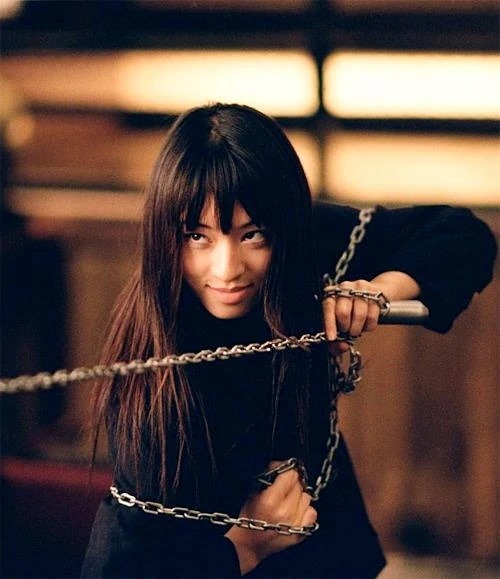
radical feminist of the day: gogo yubari
#radfem#radical feminism#radical feminist theory#radical feminist#terf#terf safe#trans exclusionary radical feminism#gender critical#terf positivity#character of the day#radfem of the day#terfs do touch#radfems do touch#gogo yubari#kill bill#films
23 notes
·
View notes
Text
guys. saltburn oomfs. i'm going insane. help me. SHOULD I WRITE A THESIS ON EMERALD'S WORK?
i want to write about promising young woman and saltburn as examples of feminine and queer monstrosity. theories of the monstrous feminine (which other scholars have linked to pyw) challenge patriarchal representations of women, while queer monstrosity has often been reclaimed by queer people. i'd argue that the events of the films align with film/cultural theories of abjection, or disrupting cultural boundaries. this operates on multiple levels: the lead characters are abject in that they push the boundaries of polite society, but the films themselves are also abject because they challenge people and make them uncomfortable, leading to the intense, often critical, response we've seen to both her films. i want to talk about her films as using genre to comment on culture, and how both subvert their genres. i also need to explain how radical it is that saltburn is canonically and proudly queer. so. there's a lot there lmao i can't stop thinking about this please share thoughts
#saltburn thesis ahaha jk unless#the way i literally don't even have to write a thesis#but i need to cement my emerald fennell scholar status#emerald fennell i worship you
24 notes
·
View notes
Note
People on this site keep talking about how social media has become more prudish and anti-sex, but I kinda wonder if that's just because you're sharing space with 15 year olds? Like do you think adults are actually anti kink and anti sex in movies etc, or are there just a bunch of (understandably) squeamish teenagers with a platform who will probably grow out of it?
I think about this a lot and have a few converging theories.
-Like you said, teenagers. Being squeamish about sex as a teenager is normal, but excessively projecting that outward instead of treating it as a "me problem" is abnormal. I think a lot of this comes down to the state of online behavior and the factors that shaped it.
-Internet moderation. The crackdown on sex work, nudity, or even in TikTok's case swearing, to appease advertisers. Tumblr's porn ban the most notorious example, and it caused a lot of people to migrate their discourse from a blogging platform with hyperlinks and no character limits to 140 character tweets and one minute videos.
-Everyone is radical and nobody is. ACAB is just a catchy slogan, every corporate PR department has something to say about "uplifting BIPOC voices," and kids who love to tweet about how "Stonewall was a riot" will call the cops on you if you wear a harness. I'm being slightly hyperbolic, but I think much of today's radicalism comes down to aesthetics and branding. It requires no real examination of biases and mechanisms of control. You can dress up even downright reactionary takes in progressive language and be applauded for it.
-The noble cause of Me Too and its weird mutations. It's understandable. If you read about how women in film are treated, I can understand why you'd have reservations about sex scenes. Then again, this doesn't account for "it's gross" and "it doesn't advance the plot." I know we don't want to hear "has Me Too gone too far," and I don't believe that, but am I wrong to also wonder if people arguing about the "power dynamics" of couples in slightly different stages of their 20's are feeding into something sinister?
-Sex positivity is cringe now. So is polyamory, kink, or any non-normative relationships or pleasure. Couldn't tell you why, but I can tell you the internet is full of TERFs and other reactionaries and the joyless, gullible people who listen to them.
-Queer assimilation. This sounds like an oxymoron, but I think the label of "queer" is going through the same identity crisis now that "gay" went through first. We're seeing a new vision of queerness that is fluffy, neutered, de-clawed, and flying off the shelves. If you grew up with "love is love," you don't have to relate to the seedy counterculture of yesteryear, but you don't have to snub your nose at it either.
I do think some of these people will grow out of it. I did, at least. I want to say none of this matters, that it's just online behavior, but everyone is so online these days that it's hard to draw these lines. TERFs, for instance, are some of the most miserable, online people on the planet, yet their real-world impact is undeniable. So many right wing movements are driven by simple outrage and disgust. This has all been very gloomy, so if you want to talk solutions: live your life and live it loudly. Encourage people to live with a healthy amount of discomfort or mind their own business. Everyone talks about growing up like it's just about stress or responsibility, but growing up can also mean no longer caring about things that used to bother you. It's fun! Everyone ought to try it.
243 notes
·
View notes
Text
Nigel's life beliefs can be traced to Hegel's philosophical concept of death. According to this theory, the manifestation of self-development for a person represents Negativity. Man, defined in his being by Negativity, is not a statically given Being, but an Action of self-affirmation or creation of himself. Complete correspondence between substance and subject can be achieved only “at the end of time,” when the creative movement of man, carried out by the negation of the natural and human, ends..
It is accomplished in the denial of the natural or human. Nature in Man and for Man is “sin”: he can and must oppose himself to it and deny it in himself, he is independent and free in relation to it. Nigel is obsessed with the idea of death, he mocks all the threads that connect him with life: he conducts experiments on animals, “creates” by killing people, ends his life - this is how he denies everything natural and human around and in himself.
a person is insignificant, but he can rise through thinking.
Nigel's thinking is impeccable, goes far ahead. but this does not bring him closer to eternity. Does he then seek to gain power over the thinking of others? Nigel "chaos". reason and freedom are presented as one whole in the film. Nigel influences Alex through Alex's emotions, his sensual side. Nigel deliberately leaves Alex as an observer in order to radically change his thinking without his noticing. Alex is having a hard time with his losses and begins to rethink his life, but since there is no punishment, he gradually assures himself that everything is going right.
Is it really Alex Jack and not a servan?

#rant time. I omitted all the philosophical questions and problems of Pascal and some others#it seems to me that it is already difficult to read.#like minds#nigel colbie#murderous intent#alex forbes#depressive period autumn is ending
33 notes
·
View notes